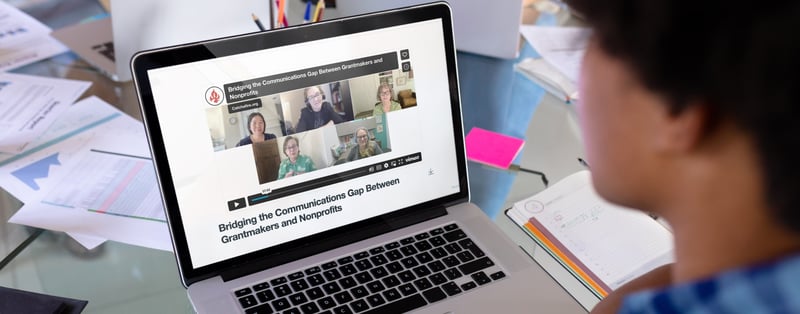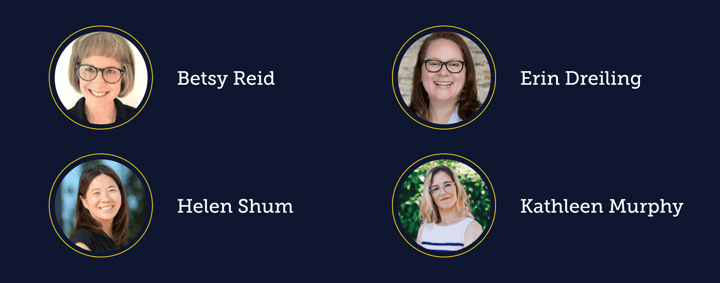PEAK Grantmaking and Catchafire unite for capacity building

We recently hosted a dynamic webinar titled "Bridging Communications Gaps Between Grantmakers & Nonprofits," where our virtual stage was graced by a distinguished panel of communications leaders in the grantmaking world. Moderated by Guenevere Crum, Director of Community Engagement at Catchafire, this thought-provoking discussion brought together expertise from Betsy Reid, Senior Communications Director at PEAK Grantmaking, Erin Dreiling, Senior Marketing and Communications Manager at the Community Foundation for Greater Atlanta, Helen Shum, Director of Communications at the Meyer Memorial Trust, and Kathleen Murphy, Digital Strategy expert at Giving Tuesday.
Together, these voices shed light on the critical role of effective communication in strengthening the bond between grantmakers and nonprofits, offering invaluable insights. Here are key takeaways shared during this enlightening conversation, providing a valuable resource for anyone interested in advancing the impact of philanthropy through improved communication strategies.

Rethink the grantmaker-grantee relationship
The discussion during the webinar emphasized the urgent need for grantmakers to rethink their relationships with grantees, nonprofits, and partners. This sentiment reflects a growing recognition that the traditional grantmaker-grantee relationship must evolve beyond the conventional transactional model. Instead, the emphasis should be on fostering partnerships that prioritize open and active communication. Grantmakers possess a wealth of knowledge and resources to share, but they must also acknowledge the importance of listening to the insights and needs of grantees. This shift towards a more collaborative and equitable partnership holds the potential to catalyze positive change within the philanthropic landscape.
“We have a great opportunity to do things better and differently. And at the same time, we really need to sort of figure out who we are and how we're going to engage with one another in a healthier, more sustainable way.” - Helen
Market yourself to grantees
The evolving landscape demands that grantmakers adapt their communication strategies to the changing times. Traditional metrics like email open rates, click rates, RSVPs, and no-show rates have seen declines, necessitating a pivot in outreach methods. Many conventional communication processes, whether internal or external, no longer resonate as they once did.
“Our collective behavior is different. And so figuring out how to share information and really market ourselves to the nonprofit partners that we work with is a little bit more challenging right now, and requires a bit more creativity.” - Erin
This evolving landscape is viewed as an opportunity—an opportunity to creatively reinvent communication strategies and establish more effective, engaging ways of connecting with grantees and stakeholders.
Name and address the power dynamics
To truly empower nonprofits and communities, grantmakers must confront and address the prevailing power dynamics in philanthropy.
“This gap inherently lies in the way power dynamics currently function, and have historically functioned in the nonprofit and philanthropic industrial complex. We need to destroy it. I don't even think it's a matter of shifting at this point. I think it's a matter of completely destroying it.” - Betsy
It begins with a fundamental shift in perspective: centering the nonprofits and not the funders themselves. This shift represents a seismic change in the traditional grantmaker-grantee relationship, emphasizing equity, collaboration, and shared decision-making. Grantmakers can proactively work to dismantle hierarchies and amplify the voices of the organizations and communities they support, ultimately fostering a more inclusive and impactful approach to philanthropic work. By recognizing nonprofits as equal partners and actively engaging them in the decision-making process, grantmakers can forge a path toward a more equitable philanthropic ecosystem.
“It is absolutely critical that we start to build more equitable partnerships that are not just about nonprofits and foundations, but the third sector of folks in here that are our community and the people that we serve.”
Kathleen
Define the role of communications at your organization
The speakers offered profound perspectives on the pivotal role that communications plays within their respective organizations. They discussed how effective communication strategies are central to building strong relationships with grantees and communities, adapting to changing times, and fostering equitable partnerships in the world of grantmaking.
“Our role as a comms program and team is to motivate and inspire them through peer practices of folks who are leading the way to do that and who are showing up back to what we were saying before, really centering the nonprofits in their work.” - Betsy
“I think the role of communications at our community foundation has changed to listening instead of talking as much, and knowing the values that your organization is pushing forward and connecting.” - Erin
“The objective and our mission of Giving Tuesday is to affect mass behavior change, toward radical generosity. This notion that someone else's suffering should be as intolerable to me as my own suffering, and that we can build a society that's more inclined to everyday acts of generosity, not just giving dollars. We think that generosity is absolutely critical to the way that we build the world that we all want to live in.” - Kathleen
“Our team at Meyer really serves as that connective tissue, we're connected to everyone in the organization in some way. The value of communications and integrating it across our internal team helps us do all of the things in terms of service.” - Helen
Digital vs. print assets

Panelists shared their insights on digital versus print assets in their respective offices, providing diverse perspectives on how they utilize both mediums in their communication strategies.
“I think the very best communications pieces, digital or print, are completely wasted if they don't reach the people that they need to reach. It's about meeting people where they are.” - Erin
“I'm going to take it even a step further and recommend that social impact communicators get out of folks' email inboxes and get directly into their phones. So text messaging, WhatsApp, these are not in our future, they are very much our present right now, and I'm afraid that if nonprofits, foundations don't jump into that, they're gonna get left behind. It's not even a question of print versus digital. It's digital versus outside of the box tactics.” - Kathleen
“Digital rules for sure. Our community votes and we're listening to them. When we get skyhigh email rates and no one unsubscribes and tons of clicks, they're telling us we really appreciate those emails, keep 'em coming or this schedule works. When they engage on social media, they're telling us that this is a really valuable channel for us. I do think print can be a breakthrough medium though. At PEAK, we've been experimenting with that over the last couple of years and our hope is to see if we can leverage print. So we’re about 95% digital and then there are these print opportunities.” - Betsy
Center grantee success stories
Our speakers discussed the importance of centering and supporting grantee success stories. They underscored how these narratives not only serve as powerful testaments to the impact of philanthropic efforts but also play a pivotal role in building trust, fostering collaboration, and inspiring further engagement. With a shared commitment to amplifying the voices of those they support, our panelists provided insights into the strategies they employ to elevate grantee success stories, making them a focal point in their communications and outreach efforts.
“We’re telling stories that aren't exploitative and supporting the organizations and the nonprofits that we want to fund. Who's at the table helping to identify the content and the stories that you tell? Holding ourselves accountable and operating with humility is really important. We want to make sure that our content and the stories that we tell align with that.”
Helen
“Ask yourself what you’re willing to share with your nonprofit partners. As a funder, are you willing to be candid and transparent with the nonprofits in your community through your communications? That's not on the communications team, that's on the organization. It starts with the organizational values. Are you showing humility as a grantmaker? Are you showing an openness to feedback and changing your practices?” - Betsy
About our speakers

Betsy Reid, Senior Communications Director, PEAK Grantmaking
Betsy is a seasoned communications leader with over 20 years of experience in nonprofit communications and association leadership roles, specializing in building comprehensive communications, marketing, publications, and multimedia programs that promote understanding, engagement, and social impact. She has a track record of success, having previously served as vice president of marketing and communications at the Georgia Center for Nonprofits, where she led initiatives such as Georgia's Giving Tuesday campaign, raising $28 million for the state's nonprofits. Betsy is also an active volunteer and holds various committee and board positions in organizations like Independent Sector, the American Society of Association Executives, and Theatré du Rêve in Atlanta. She earned her bachelor's degree from Tufts University and is a member of Phi Beta Kappa.
Erin Dreiling, Senior Marketing and Communications Manager, Community Foundation for Greater Atlanta
Erin manages all aspects of marketing and communications for the Community Foundation for Greater Atlanta, with a focus on brand strategy, messaging, digital and print marketing and relationship development. Before joining the Community Foundation, Erin worked in nonprofit administration and fundraising with several Atlanta arts organizations including the Alliance Theatre, the Center for Puppetry Arts and Actor’s Express. She holds a degree in fine and performing arts from Massachusetts College of Liberal Arts and is certified in project management.
Helen Shum, Director of Communications, Meyer Memorial Trust
Helen Shum is the Director of Communications at Meyer Memorial Trust, a private foundation based in Portland, Oregon. She champions, elevates and promotes Meyer’s mission and its grantees, ensuring that the voice of Meyer is both clear and inspired at a dynamic time for the organization. In 2023, Meyer debuted a strategic framework that advances a collective vision of racial, social and economic justice. Prior to Meyer, she worked in early childhood advocacy communications and print journalism.
Kathleen Murphy, Digital Strategy, Giving Tuesday
Kathleen Murphy Toms is the director of digital communications for GivingTuesday. The biggest philanthropic movement in history, GivingTuesday leverages social media and a broad network to ignite a movement and global call to action to give. It has seen record-breaking engagement at every level of society - from some of the world's biggest celebrities and influencers to students, volunteers, and everyday givers. Kathleen is a faculty member at New York University's Center for Global Affairs.
Don't miss out on critical grantmaking conversations
Visit our events page to RSVP for upcoming foundation programming and discussions like these. If you’re a nonprofit, grantmaker, or company, and would like to learn more about Catchafire, let’s connect. Email us here.



